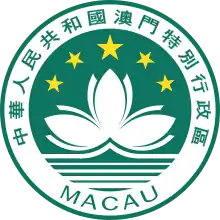1999 Macanese Chief Executive election
Chief Executive elections were held in Macau on 15 May 1999 to elect the first Chief Executive (CE), the highest office of the Macau Special Administrative Region, before Macau was due to be handed back to China by Portugal. Edmund Ho was elected as the first leader of the Macau SAR. This was the only contested Chief Executive election to date.
| |||||||||||||||||||
| |||||||||||||||||||
| |||||||||||||||||||
Candidates
- Edmund Ho Hau-wah, former member of the Selection Committee of Macau Special Administrative Region Government
- Stanley Au Chong-kit, former member of the Selection Committee of Macau Special Administrative Region Government
Results
| Candidate | Party | Votes | % | |
|---|---|---|---|---|
| Edmund Ho | Independent | 163 | 82.74 | |
| Stanley Au | Independent | 34 | 17.26 | |
| Total | 197 | 100.00 | ||
| Valid votes | 197 | 98.99 | ||
| Invalid votes | 0 | 0.00 | ||
| Blank votes | 2 | 1.01 | ||
| Total votes | 199 | 100.00 | ||
| Registered voters/turnout | 200 | 99.50 | ||
| Source: China.cn | ||||
Reactions
Edmund Ho thanked the Selection Committee and Macanese residents for their support after elected as Chief Executive and vowed to uphold "One Country Two Systems" framework. Governor of Macau Vasco Joaquim Rocha Vieira, the then-leader of the city, congratulated Ho's win and promised a smooth handover of sovereignty.
Despite some regarded Au as a democrat challenging the one-man election, Stanley Au was later appointed to the Legislative Assembly by Ho after SAR established, and joined Chinese People's Political Consultative Conference in 2005. In 2019, Au described his bid, which made the only contested Chief Executive election in Macau as of now, as naïve.[1]
References
- "稱特首選舉一直都是一個人的選舉 區宗傑︰我當時參選只是年少無知". AllAboutMacau Media. 2019-04-25. Archived from the original on 2019-07-19. Retrieved 2021-11-21.
.jpg.webp)

